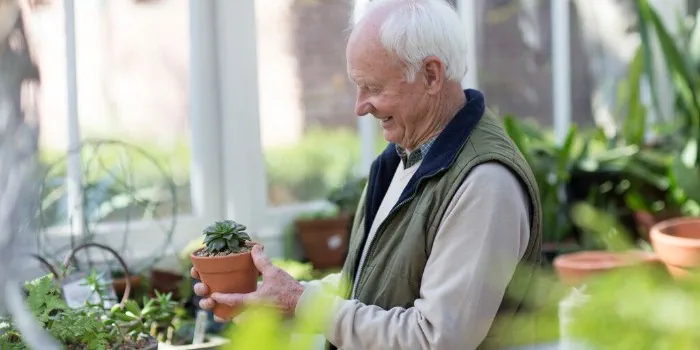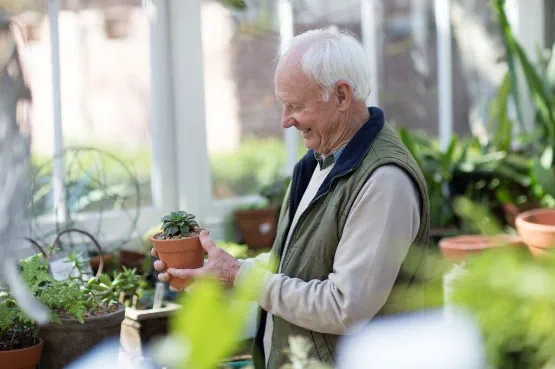How to prevent falls as you age
Falls become more common as we get older. Around one in three people over the age of 65 will have at least one fall a year. A fall can be a distressing, lead to injury, and affect your confidence and independence. But there are many ways to reduce your risk of falling – from staying active and making your home safer. In this article we look at why falls might happen and what you can do to prevent them.

Are falls a normal part of ageing?
Anyone can have a fall, but the risk increases with age. One in three people aged 65 over have a fall at least once a year. But falls aren’t an inevitable part of getting older. Normal changes in strength, balance, vision, and thinking (cognition) can contribute to your risk of falling.
What is the main cause of falls?
Increasing age is a risk factor for falls, especially at age 65 and above. As we age, factors that can increase the chance of falling include:
- reduced strength and balance
- slower reaction times
- poor vision or hearing
- health conditions (such as stroke or Parkinson’s)
- home hazards (such as loose rugs, poor lighting, or wet floors)
- certain medications and multiple prescriptions (polypharmacy)
Falls are also much more likely if you’ve already had a fall before.
What conditions can make you fall?
Your risk of falling can be increased if you have conditions such as:
- arthritis
- diabetes
- stroke
- incontinence
- Parkinson’s disease
- muscle weakness or frailty
- poor balance
- cognitive impairment or dementia
- depression
- alcohol misuse
What medications are associated with falls?
Some medications can affect your balance, coordination, or alertness — especially when you use two or more at the same time. This is known as polypharmacy, and it’s a key risk factor for falls in older adults.
Below are medications associated with higher fall risk.
- Benzodiazepines used for anxiety, sleep, or seizures — may cause drowsiness and impaired coordination.
- Antidepressants can affect blood pressure, balance, or alertness.
- Blood pressure-lowering medications may cause dizziness, especially when standing up quickly (orthostatic hypotension).
- Antipsychotics, sedatives, neuropathic medication and opioid painkillers also carry a fall risk due to drowsiness and delayed reaction times.
It’s important to review your medication regularly with your GP or pharmacist. Never stop taking a prescribed medication without medical advice.
What can I do to prevent falls?
Below are things you can do to help lower your risk of falls. If you have a history of falls, a GP or physiotherapist can help you with further falls prevention.
Improve balance and strength
Poor balance is a risk factor for falls. Regular strength and balance training can make a big difference. Aim for at least two sessions a week. Great options include tai chi, bowls or dancing. Here are some simple balance exercises you can try.
- One-legged stand. Stand on one leg for up to 10 seconds. Hold onto a chair if needed.
- Sit-to-stand. Rise from a chair 10 times. Start with hand support if necessary. Start using one hand to push off if you need to, progressing to no hands when you’re ready.
- Heel and toe raises. Using a chair or table for support, slowly raise your heels off the floor so you’re standing on your toes. Repeat the exercise raising your toes, so that you stand on your heels. As you progress, try extending how long you hold the raise for. You can also try taking some steps on your toes or heels.
- Sideways walking. Stand with your feet together and slowly step sideways. Then move your other foot to join it. Try performing 10 steps in each direction.
- Heel-to-toe walk. Walk in a straight line with the heel of one foot touching the toe of the other. Use a wall for support while you build confidence.
Keep active
People aged 65 and above are recommended to get at least 150 minutes of moderate intensity exercise per week. Examples of moderate exercise include swimming, cycling and brisk walking. Even if you haven’t exercised much before, it’s never too late to start. Keeping active can help your muscle strength and balance.
Make your home safer
Simple changes at home can significantly reduce your fall risk.
- Clear any clutter in hallways and stairs that might cause you to trip.
- Add good lighting, especially in hallways and bathrooms - you could even get motion-activated lights.
- Install handrails and non-slip mats in places like the garden and bathroom.
- Secure rugs or remove them.
If you need support, you can contact the adult social services department of your local council about getting home adjustments.
Have regular health checks
Make sure to have regular vision and hearing checks. You should have an eye test every two years or sooner if you notice any changes. You can also find free hearing tests online, or be referred to an audiologist by your GP.
Look after your bone health
Keeping your bones strong can help reduce risk of falls and fractures. Weight bearing exercising can help strengthen your bones. Vitamin D and calcium can also support your bone health. Calcium is found in dairy products. If you can’t eat dairy, you can still get calcium from plant based foods and drinks fortified with calcium. You can get vitamin D from some foods, but the main source will be sunlight. Adults in the UK are recommended to supplement vitamin D between October and March.
Wear suitable footwear
Wearing safe and supportive shoes can help you stay steady. You should wear shoes with low heels (under 4cm) with a good grip, and that are a snug fit. Avoid walking bare-foot or in socks at home as this can lead to slipping.
If you have any foot problems, it’s important to get it checked out by a doctor or podiatrist.
What should I do if I have a fall?
You might find it helpful to know what to do in case you do have a fall, so that you’re prepared.
- If you’re not hurt, try to slowly get yourself back up. Roll onto your hands and knees and hold on to something to keep yourself stable.
- If you are hurt, try to call for help. You could use a personal alarm or your mobile phone. It’s good to have saved numbers of key people to contact in an emergency. You can also call 999 or 111 for help.
See your GP if you had a fall even if you feel okay. They can help to understand how it happened and suggest ways to prevent falling again.
Are you aged over 65 and wondering about your health and wellbeing? Bupa's Mature Health assessment gives an insight into your current health, as well future health risks for conditions such as heart disease, diabetes and certain types of cancer. We also offer a year of ongoing support, with nurses on hand all day every day with our Anytime HealthLine to help you meet your health goals.
-
Sources Sources
- Falls – assessment. NICE Clinical Knowledge Summaries. cks.nice.org.uk, last revised June 2025
- Comprehensive Geriatric Assessment (CGA): Falls history. British Geriatric Society. bgs.org.uk, updated June 2025
- Pillay J, Gaudet LA, Saba S, et al. Falls prevention interventions for community-dwelling older adults: systematic review and meta-analysis of benefits, harms, and patient values and preferences. Syst Rev. 2024 Nov 26;13(1):289. doi: 10.1186/s13643-024-02681-3
- Falls. World Health Organization. who.int, published April 2021
- Montero-Odasso M, van der Velde N, Martin FC, et al. World guidelines for falls prevention and management for older adults: a global initiative. Age Ageing. 2022 Sep 2;51(9):afac205. doi: 10.1093/ageing/afac205. Erratum in: Age Ageing. 2023 Sep 1;52(9):afad188. doi: 10.1093/ageing/afad188. Erratum in: Age Ageing. 2023 Oct 2;52(10):afad199. doi: 10.1093/ageing/afad199
- Dhalwani NN, Fahami R, Sathanapally H, et al. Association between polypharmacy and falls in older adults: a longitudinal study from England. BMJ Open. 2017 Oct 16;7(10):e016358. doi: 10.1136/bmjopen-2017-016358
- van der Velde N, Seppala LJ, et al. European position paper on polypharmacy and fall-risk-increasing drugs recommendations in the World Guidelines for Falls Prevention and Management: implications and implementation. Eur Geriatr Med. 2023 Aug;14(4):649-658. doi: 10.1007/s41999-023-00824-8
- UK Chief Medical Officers' physical activity guidelines. Department of Health and Social Care. gov.uk, updated January 2020
- Helping older people stay active at home. Chartered Society of Physiotherapy. csp.org.uk, review April 2020
- Preventing falls. Age UK. ageuk.org.uk, last updated September 2024
- Eye health. Age UK. ageuk.org.uk, updated February 2025
- Vitamin D. British Dietetic Association. bda.uk.com, published November 2024
- Calcium. British Dietetic Association. bda.uk.com, published March 2021
About our health information
At Bupa we produce a wealth of free health information for you and your family. This is because we believe that trustworthy information is essential in helping you make better decisions about your health and wellbeing.
Our information has been awarded the PIF TICK for trustworthy health information. It also follows the principles of the The Information Standard.

More general health advice articles
Did you find our advice helpful?
We’d love to hear what you think. Our short survey takes just a few minutes to complete and helps us to keep improving our healthy lifestyle articles.
Legal disclaimer
This information was published by Bupa's Health Content Team and is based on reputable sources of medical evidence. It has been reviewed by appropriate medical or clinical professionals and deemed accurate on the date of review. Photos are only for illustrative purposes and do not reflect every presentation of a condition.
Any information about a treatment or procedure is generic, and does not necessarily describe that treatment or procedure as delivered by Bupa or its associated providers.
The information contained on this page and in any third party websites referred to on this page is not intended nor implied to be a substitute for professional medical advice nor is it intended to be for medical diagnosis or treatment. Third party websites are not owned or controlled by Bupa and any individual may be able to access and post messages on them. Bupa is not responsible for the content or availability of these third party websites. We do not accept advertising on this page.





